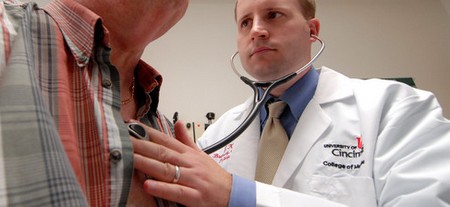Diverticulosis is a condition in which pea-sized pouches form on the walls of your intestines. Although the small pouches, called diverticula, don’t cause any symptoms themselves, they sometimes become infected and inflamed causing diverticulitis.
When a diverticulum becomes infected, bacteria can enter through tiny tears in your bowel, forming small abscesses. Sometimes these abscesses cause discomfort for a few days and then go away. In a few rare cases, the infection can break through the wall of the colon and spill out into your abdomen. This is a dangerous condition called peritonitis, which usually causes severe abdominal pain, fever, nausea, and vomiting. Peritonitis can lead to death if you don’t get medical help quickly.

Although diverticulitis rarely becomes life-threatening, you should see your doctor. He will probably prescribe antibiotics to fight the infection. BedPrest and a clear liquid diet will help your tender bowels heal more quickly. You should also avoid eating small, hard foods like popcorn, nuts, and seeds because they can get stuck in an already inflamed pouch and irritate it even more. Surgery may be necessary to drain any abscesses that have formed.
The long-range plan for diverticular disease
If you’re over 60, you have about a 50/50 chance of having diverticulosis. This common condition affects about half the people in the over 60 age group and about 10 percent of people over 40. Although the condition is common, complications from diverticulosis are rare. The best way to avoid complications is to avoid developing diverticulosis in the first place.
- Fiber up. A high-fiber diet can reduce your risk of developing those pesky pouches. Fresh fruits are especially important sources of fiber because they boost the growth of good microbes in your intestines. These tiny microbes help increase bowel movements and keep waste moving through your system rapidly, reducing your chances of developing diverticular disease. Many people who have diverticulitis find that their symptoms disappear within a couple of weeks if they simply add lots of fiber-rich foods to their diet. Some examples of good high-fiber fruits are blackberries, raspberries, blueberries, Dates Fruit, and pears. Be sure you increase your intake of fiber a little at a time because a sudden increase may cause uncomfortable bloating and gas.
- Wash it down with water. When you’re eating all those healthy fiber-rich foods, make sure you wash it down with a big glass of water. Water helps soften your stool so it passes through your intestines more easily. To help keep your digestive system running smoothly, drink at least eight glasses of water a day.
- Trim the fat and red meat. One scientific survey found that men who ate lots of fat and red meat were much more likely to have diverticular disease. Researchers think this may be because red meat causes intestinal bacteria to produce substances that weaken the colon, making it easier for diverticula to form. If you eat more chicken and fish and limit your fat, your intestines will appreciate it and so will your heart.
- Schedule your bathroom breaks. Constipation may make diverticular disease worse because waste sits in your intestines longer and builds up pressure that could weaken your colon walls. Schedule a regular time to go to the bathroom for a bowel movement. Don’t strain when you go because that could also increase pressure on your colon.